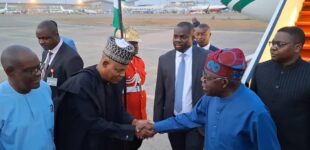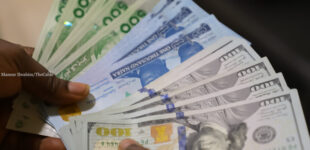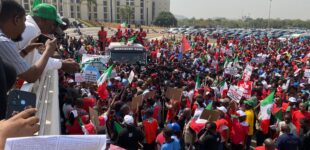Nigeria’s economy ‘on the brink’

A sense of relief dispersed across the Nigerian economy during trading last week following the central bank of Nigeria’s decision to introduce a flexible rate policy in a bid to quell the mounting pressure inflicted by the previous fixed rate.
Although key interest rates were unexpectedly maintained at 12%, it is becoming quite clear that the extended declines in oil prices have left the CBN under immense pressure to take action. Sentiment has taken a hit from the rapidly declining government revenues, while diminishing oil production from renewed militancy has left the nation on edge. Anxiety lingers across the board and there could be a possibility that the delayed 2016 budget, which was only approved in May, could have exacerbated this unfavorable situation further.
The largest economy in Africa continues to be severely injured by tumbling oil prices and this can be seen in the rising unemployment, faltering GDP growth and spiraling inflation which is dangerously rattling the nation’s stability. For an extended period, global markets have observed the central bank of Nigeria’s questionable policy measures which have simply starved the nation of Dollars and consequently slowed foreign investment. With expectations elevated that Nigeria may slide into a recession after its economy shrank in the first quarter of 2016, the Naira and NSE could be poised to decline further as investors scatter from riskier assets. While a devaluation of the Naira could alleviate some pressures, this double edge sword may likely punish the economy and the common man could feel the burn.
It should be kept in mind that Nigeria is a consuming nation which imports most of it goods and only exports oil, so there would be minimal gains from a currency depreciation. What makes matters worse is that Nigerians have acquired an inelastic appetite for foreign goods, which suggests that an appreciation in the cost of imports may have little impact on demand, resulting in less disposal income for the citizens. Although President Muhammadu Buhari remains defiant on the idea of a Naira depreciation, this action could be promoted in the future when Nigeria has diversified its economy and has acquired the ability to export items produced from its own agriculture and manufacturing sectors.
While it is strikingly clear that Nigeria is currently under immense economic pressure, this should force the nation to act swiftly, with a mission to become less reliant on the unpredictable oil markets. The steps have already been taken to diversify away from oil reliance, with investments in infrastructure for agriculture and manufacturing paving a way for future stability.
Nigeria may be forced to endure this short term pain created from the toxic mixture of declining oil prices and global instabilities, but if it can overcome this challenging period then the largest economy in Africa may re-enter the global arena as a self-reliant force to be reckoned with.
Lukman Otunuga is a research analyst at FXTM.











There are no comments at the moment, do you want to add one?
Write a comment